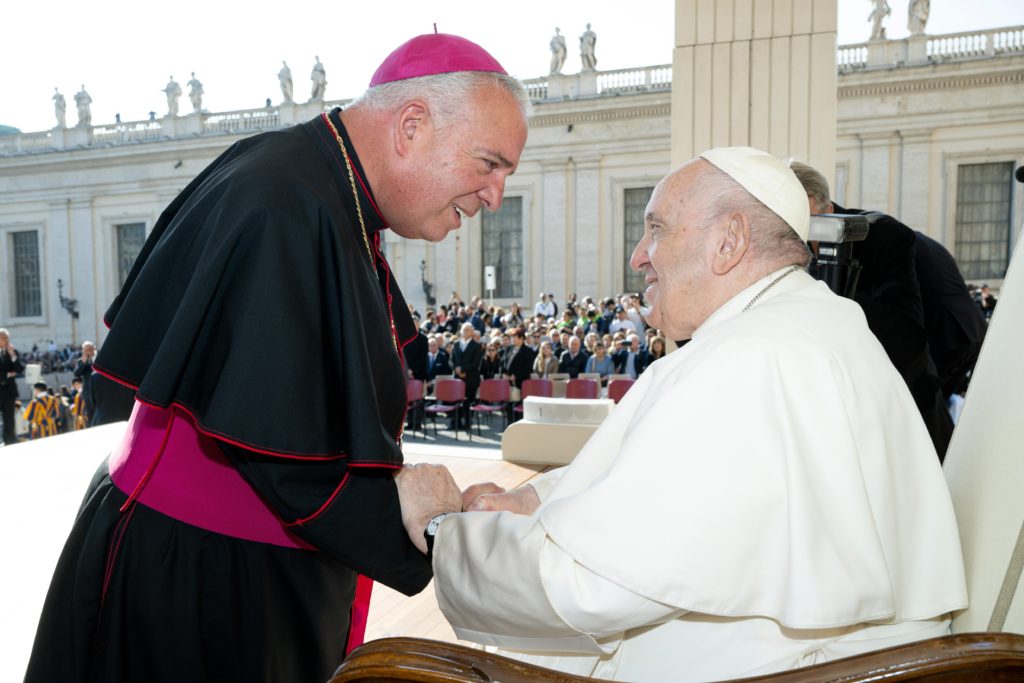Archbishop Nelson Pérez of Philadelphia, the son of Cuban exiles and a longtime leader in Hispanic ministry, will serve as the next chairman of the Catholic Relief Services’ board of directors on a three year term that runs through Nov. 2025.
Catholic Relief Services is the official overseas charitable and development arm of the US bishops.
“I was deeply honored to learn that Archbishop [Timothy] Broglio had appointed me Chair of the Board of CRS,” Perez said in a statement. “For more than 75 years CRS has been a beacon of hope for poor and vulnerable families around the world. Its humanitarian aid initiatives are often the difference between life and death for those facing poverty, famine, war and epidemics.”
Pérez’ appointment is one of the first official moves made by Broglio, head of the Archdiocese for the Military Services, since he was elected president of the United States Conference of Catholic Bishops at the conference’s fall general assembly last week.
Sean Callahan, president and CEO of CRS, said in a statement that he looks forward to working with the archbishop to address some of the “most pressing” issues the organization faces, including the global food crisis and the impact of climate change on people living in poverty.
Pérez succeeds Bishop Frank Caggiano of Bridgeport, Conn., who held the role since 2019. Pérez said Caggiano’s “work to promote and defend human life while fostering a more just and peaceful world is truly commendable,” and that he looks forward to building on his work.
In a statement, Caggiano called Pérez “a man of deep conviction about the need to protect the dignity of all of our brothers and sisters, particularly the most vulnerable among us.” He also said that he is “immensely grateful” for the past three years with the organization.
“It has been both humbling and profoundly life-changing to walk with those who are hungry, homeless and at risk around the globe, and to see how CRS programs can change lives and bring hope, while uniting us together in faith,” Caggiano said.
Catholic Relief Services was founded in 1943 by the Catholic Bishops of the United States to serve World War II survivors in Europe. It has grown to reach more than 130 million people in more than 100 countries on five continents.
Per the organization’s website, its mission is to “assist impoverished and disadvantaged people overseas, working in the spirit of Catholic social teaching to promote the sacredness of human life and the dignity of the human person.”
Pérez was ordained a priest for the Archdiocese of Philadelphia in 1989. He served his first 23 years as a priest at the parish level, with a focus on ministry to Hispanic Catholics. Pope Francis made him an auxiliary bishop for the Diocese of Rockville Centre, N.Y., in 2012, and then bishop for the Diocese of Cleveland, Ohio, in 2017. Pope Francis appointed him to the Archdiocese of Philadelphia in 2020.
The archbishop on Nov. 22 also thanked Broglio for “his confidence in my ability to provide counsel and serve the best interests of the poor and vulnerable,” and expressed excitement to collaborate with the other CRS board members “whose hearts are on fire for Jesus and serve as His missionary disciples.”
“I ask for your prayers as I embrace this new role in service to the broader Church,” he said.
The U.S. bishops at the fall general assembly elected three episcopal board members. Archbishop Gregory Hartmayer of Atlanta was elected to serve a first term. Meanwhile, Bishop Mark Seitz of El Paso, and Bishop Anthony Taylor of Little Rock, Arkansas, were each elected to serve a second term on the board.
Beginning on Jan. 1, 2023, Matthew McKenna will begin his term as a member of the CRS board of directors. McKenna is currently at Georgetown University’s McDonough School of Business, where he founded an initiative to study the role of the private sector investment in rural economic development.
Broglio will be leaving his role as the Chair of the CRS Overseas Operations Committee. And Stephen Walsh, who the organization described as a “strong advocate for innovative financing and supporting responses for local communities” will leave the CRS board after six years.

